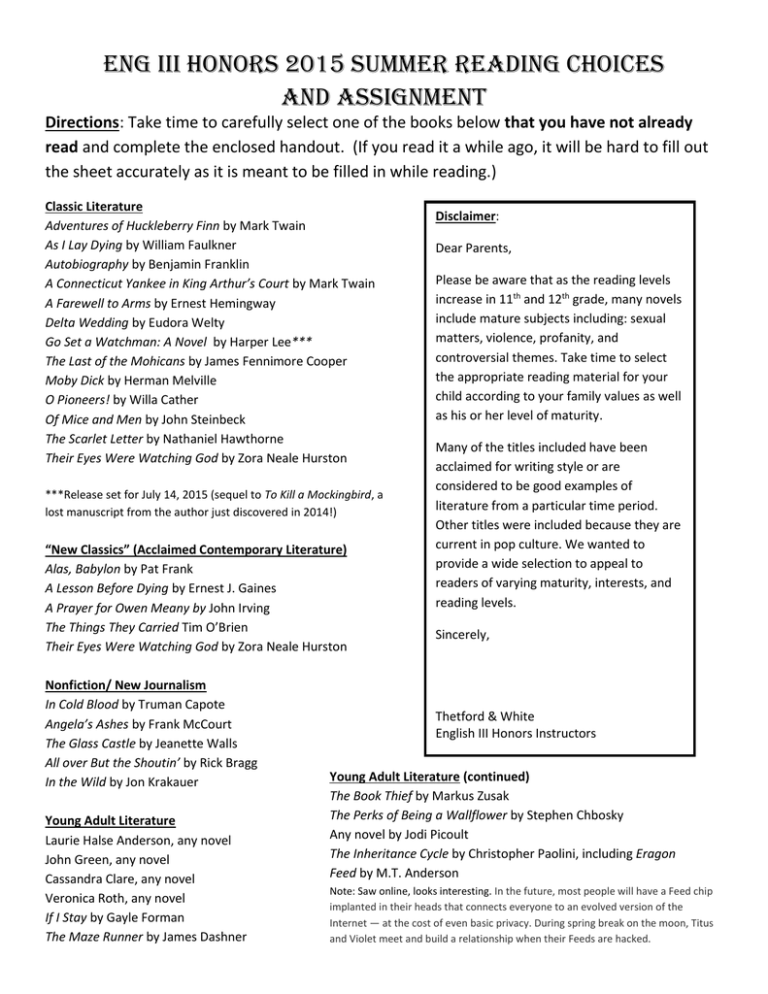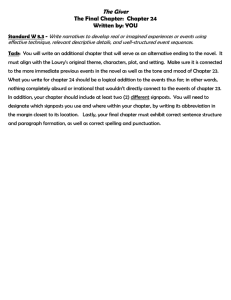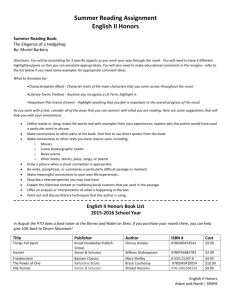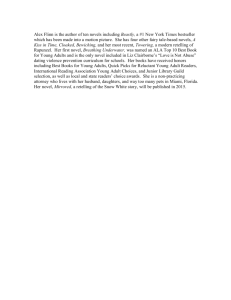that you have not already read
advertisement

Eng III Honors 2015 Summer Reading Choices and Assignment Directions: Take time to carefully select one of the books below that you have not already read and complete the enclosed handout. (If you read it a while ago, it will be hard to fill out the sheet accurately as it is meant to be filled in while reading.) Classic Literature Adventures of Huckleberry Finn by Mark Twain As I Lay Dying by William Faulkner Autobiography by Benjamin Franklin A Connecticut Yankee in King Arthur’s Court by Mark Twain A Farewell to Arms by Ernest Hemingway Delta Wedding by Eudora Welty Go Set a Watchman: A Novel by Harper Lee*** The Last of the Mohicans by James Fennimore Cooper Moby Dick by Herman Melville O Pioneers! by Willa Cather Of Mice and Men by John Steinbeck The Scarlet Letter by Nathaniel Hawthorne Their Eyes Were Watching God by Zora Neale Hurston ***Release set for July 14, 2015 (sequel to To Kill a Mockingbird, a lost manuscript from the author just discovered in 2014!) “New Classics” (Acclaimed Contemporary Literature) Alas, Babylon by Pat Frank A Lesson Before Dying by Ernest J. Gaines A Prayer for Owen Meany by John Irving The Things They Carried Tim O’Brien Their Eyes Were Watching God by Zora Neale Hurston Nonfiction/ New Journalism In Cold Blood by Truman Capote Angela’s Ashes by Frank McCourt The Glass Castle by Jeanette Walls All over But the Shoutin’ by Rick Bragg In the Wild by Jon Krakauer Young Adult Literature Laurie Halse Anderson, any novel John Green, any novel Cassandra Clare, any novel Veronica Roth, any novel If I Stay by Gayle Forman The Maze Runner by James Dashner Disclaimer: Dear Parents, Please be aware that as the reading levels increase in 11th and 12th grade, many novels include mature subjects including: sexual matters, violence, profanity, and controversial themes. Take time to select the appropriate reading material for your child according to your family values as well as his or her level of maturity. Many of the titles included have been acclaimed for writing style or are considered to be good examples of literature from a particular time period. Other titles were included because they are current in pop culture. We wanted to provide a wide selection to appeal to readers of varying maturity, interests, and reading levels. Sincerely, Thetford & White English III Honors Instructors Young Adult Literature (continued) The Book Thief by Markus Zusak The Perks of Being a Wallflower by Stephen Chbosky Any novel by Jodi Picoult The Inheritance Cycle by Christopher Paolini, including Eragon Feed by M.T. Anderson Note: Saw online, looks interesting. In the future, most people will have a Feed chip implanted in their heads that connects everyone to an evolved version of the Internet — at the cost of even basic privacy. During spring break on the moon, Titus and Violet meet and build a relationship when their Feeds are hacked. Great Authors of Particular Genres: Coming of Age Novels Sue Monk Kidd – coming of age books Ursula Le Guin – sci-fi, coming of age Ethnic Literature Jimmy Santiago Baca – Hispanic/Native American literature Julia Alvarez – Hispanic literature Amy Tan – Asian-American literature Maxine Hong Kingston – Asian-American literature Suspense/Thrillers Stephen King – Horror, suspense James Patterson - thrillers, mysteries, young adult novels, and more John Grisham – legal thrillers, suspense Dean Koontz, suspense Tom Clancy, techno-thriller/ spy/ war Mysteries Agatha Christie (classic mystery) Mary Higgins Clark (contemporary mystery) Patricia Cornwell (forensic pathologist solves serial killer mysteries) Kathy Reichs (Temperance Brennan Novels/ basis of TV show Bones) Post Apocolyptic Lois Lowry, The Giver Series, coming of age Max Brooks - Zombie Literature – World War Z Susan Beth Pfeffer – Life As We Knew It (series) Supernatural Anne Rice - Supernatural Literature (vampires) Katherine Howe – The Physic Book of Deliverance Dane, fits perfectly with the Salem Witchcraft Trials Paula Brackston – Supernatural Literature (witches) Deborah Harkness – Supernatural Literature (witches, werewolves, vampires, and daemons) Alternative Universes/ Other worlds George R. R. Martin, Game of Thrones Frank Herbert -Sci-Fi Worlds – Dune, the 40th Anniversary version Miscellaneous Laura Hillenbrand - Horses – Seabiscuit Complete the attached handout and bring it with you the first day of school. Name:_______________________ Class Per. 1 2 3 4 5 6 7 Date: _________ Summer Reading Log There are 6 signposts that can be found as we read. As you read if you look for the signs and are able to answer the accompanying question, you can dig even deeper into text than you have ever imagined possible. These signs and your analysis of them will drive you further into the character’s psyche. Complete this log (all six signposts) for the entire book. Your log entries must be thorough and NOT just scratch the surface. DIG, and have fun doing it!!!! NOTICE AND…. NOTE SIGNPOSTS THAT YOU MIGHT NOTICE: LIST BRIEFLY WHERE YOU FOUND THE SIGNPOST IN TEXT AND ANSWER THE QUESTION THOROUGHLY. 1. Contrasts and Contradictions Contrasts and Contradictions 1. When a character does something that contrasts with what you would expect or contradicts his earlier acts or statements, STOP and ask yourself: Why is the character doing that? 2. Aha Moment When a character realizes, understands, or finally figures out something, STOP and ask yourself: How might this change things? 2. 3. Aha Moment 1. 2. 3. 3. Tough Questions When a character asks himself a very difficult question or is struggling internally with a hard decision, STOP and ask yourself: What does this question make me wonder? 4. Words of the Wiser When a character (probably older and wiser) takes the main character aside and offers serious advice, STOP and ask yourself: What’s the life lesson and how might it affect the character? Tough Questions 1. 2. 3. Words of the Wiser 1. 2. 3. 5. Again and Again When you notice a word, phrase, or situation mentioned over and over, STOP and ask yourself: Why does this keep happening again and again? Again and Again 1. 2. 3. 6. Memory Moment When the author interrupts the action to tell you about a memory, STOP and ask yourself: Why might this memory be important? Memory Moment 1. 2. 3. Summer Reading Character Development Presentation English III Honors: Thetford & White Directions: Use your notes to create a visual (a poster, a PowerPoint, or a Prezi) tracking your main character’s growth or changes in the novel you chose for summer reading. The six signposts help you to see character development. Be prepared to present your findings and visual to the class on Thursday, August 27, 2015. Rubric: (100 points/ Test Grade) Quality of summer reading notes (submitted with project) - 35 points Quality of visual aid (correct, creative, demonstrates effort) – 35 points Quality of verbal presentation (loud, clear, thorough, eye contact) – 30 points Summer Reading Character Development Presentation English III Honors: Thetford & White Directions: Use your notes to create a visual (a poster, a PowerPoint, or a Prezi) tracking your main character’s growth or changes in the novel you chose for summer reading. The six signposts help you to see character development. Be prepared to present your findings and visual to the class on Thursday, August 27, 2015. Rubric: (100 points/ Test Grade) Quality of summer reading notes (submitted with project) - 35 points Quality of visual aid (correct, creative, demonstrates effort) – 35 points Quality of verbal presentation (loud, clear, thorough, eye contact) – 30 points Summer Reading Character Development Presentation English III Honors: Thetford & White Directions: Use your notes to create a visual (a poster, a PowerPoint, or a Prezi) tracking your main character’s growth or changes in the novel you chose for summer reading. The six signposts help you to see character development. Be prepared to present your findings and visual to the class on Thursday, August 27, 2015. Rubric: (100 points/ Test Grade) Quality of summer reading notes (submitted with project) - 35 points Quality of visual aid (correct, creative, demonstrates effort) – 35 points Quality of verbal presentation (loud, clear, thorough, eye contact) – 30 points






